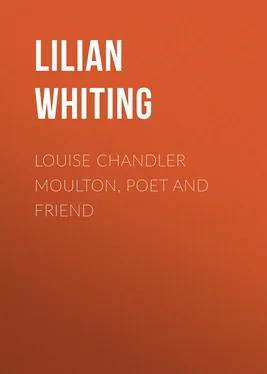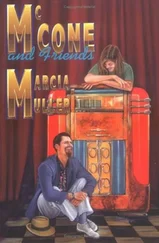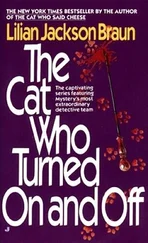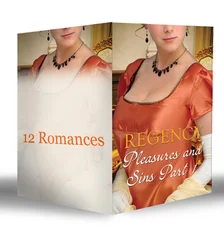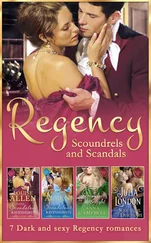Lilian Whiting - Louise Chandler Moulton, Poet and Friend
Здесь есть возможность читать онлайн «Lilian Whiting - Louise Chandler Moulton, Poet and Friend» — ознакомительный отрывок электронной книги совершенно бесплатно, а после прочтения отрывка купить полную версию. В некоторых случаях можно слушать аудио, скачать через торрент в формате fb2 и присутствует краткое содержание. Жанр: Биографии и Мемуары, foreign_antique, на английском языке. Описание произведения, (предисловие) а так же отзывы посетителей доступны на портале библиотеки ЛибКат.
- Название:Louise Chandler Moulton, Poet and Friend
- Автор:
- Жанр:
- Год:неизвестен
- ISBN:нет данных
- Рейтинг книги:4 / 5. Голосов: 1
-
Избранное:Добавить в избранное
- Отзывы:
-
Ваша оценка:
- 80
- 1
- 2
- 3
- 4
- 5
Louise Chandler Moulton, Poet and Friend: краткое содержание, описание и аннотация
Предлагаем к чтению аннотацию, описание, краткое содержание или предисловие (зависит от того, что написал сам автор книги «Louise Chandler Moulton, Poet and Friend»). Если вы не нашли необходимую информацию о книге — напишите в комментариях, мы постараемся отыскать её.
Louise Chandler Moulton, Poet and Friend — читать онлайн ознакомительный отрывок
Ниже представлен текст книги, разбитый по страницам. Система сохранения места последней прочитанной страницы, позволяет с удобством читать онлайн бесплатно книгу «Louise Chandler Moulton, Poet and Friend», без необходимости каждый раз заново искать на чём Вы остановились. Поставьте закладку, и сможете в любой момент перейти на страницу, на которой закончили чтение.
Интервал:
Закладка:
The intellectual and the social were closely blended in the Boston of the sixties and the seventies, and Mrs. Moulton was in the very midst of the most characteristically Bostonian circles. Her journals record how she went to a "great party" given by Mrs. William Claflin, whose husband was afterward governor; to Cambridge to a function given by the Agassizs; to a reception at Dr. Alger's "to meet Rose Terry," later known as Rose Terry Cooke; to a dinner given in honor of Miss Emily Faithful; to one intellectual gayety after another. She was one of the attractive figures at the delightful Sunday evening reunions given by Mr. and Mrs. Edwin P. Whipple. She notes in the journal that at a brilliant reception given by Mrs. John T. Sargent, so well known as the hostess of the famous Chestnut Street Radical Club, she had "a few golden moments" with Emerson, and a talk with the elder Henry James, with whom she was a favorite.
In 1870 Mrs. Moulton became the Boston literary correspondent of the New York Tribune . This work developed under her care into one of much importance. Boston publishers sent to her all books of especial interest, and her comments upon them were of solid value. She recorded the brilliant meetings of the Chestnut Street Radical Club, and the intellectual news in general. These letters made a distinct success. Extracts from them were copied all over the United States, and they came to be looked upon as a sort of authorized report of what was doing in the intellectual capital of the country. They were given up only when the desire for foreign travel drew Mrs. Moulton so much abroad that she could no longer keep as closely in touch with current events as is necessary for a press correspondent.
The Radical Club at that time was famed throughout the entire country, and it was regarded as the very inner temple wherein the gods forged their thunderbolts. Only those who bore the sacramental sign were supposed to pass its portals. Mrs. Moulton's accounts of these meetings were vivid and significant. As, for instance, the following:
"The brightest sun of the season shone, and the balmiest airs prevailed, on the 21st of December, in honor of the meeting of the Radical Club under the hospitable roof of Mr. and Mrs. John T. Sargent in Chestnut street. Mrs. Howe was the essayist, and there was a brilliant gathering to hear her. David Wasson was there, and John Weiss, and Colonel Higginson, and Alcott, hoary embodiment of cool, clear thought. Mr. Linton, the celebrated engraver, John Dwight of the Musical Journal , Mrs. Severance, the beloved president of the New England Woman's Club, bonny Kate Field of the honest eyes and the piquant pen, Mrs. Cheney, Miss Peabody, and many others, distinguished in letters or art.
"To this goodly company Mrs. Howe read a brilliant essay on the subject of Polarity. She commenced by speaking of polarity as applied to matter, in a manner not too abstruse for the savants who surrounded her, though it was too philosophical and scholarly to receive the injustice of being reported. The progress of polarity she found to give us the division of sex; and Sex was the subject on which she intended to write when she commenced the essay; but she found it, like all fundamental facts in nature, to be an idea with a history. In the pursuit of this history she encountered the master agency of Polarity, and found herself obliged to make that the primary idea, and consider sex as derived from it."
Another letter, describing a meeting a few weeks later, gives a glimpse at some of the women who frequented the club:
"There was Mrs. Severance, reminding one so much of an Indian summer day, so calm and peaceful is the sweet face that looks out at you from its framing of fair waving hair. Not far away was Julia Ward Howe, who some way or other makes you think of the old fairy story of the girl who never opened her mouth but there fell down before her pearls and diamonds. That story isn't a fairy story, not a bit of it. It is real, genuine truth, and Mrs. Howe is the girl grown up, and pearls of poetic fancy and diamonds of sparkling wit are the precious stones which fall from her lips. Lucy Stone was there, an attentive listener, looking the very picture of retiring womanliness in her Quaker-like simplicity of dress, and her pleasant face lighted with interest and animation. Sitting by a table, busy with note-book and pencil, was Miss Peabody, the Secretary of the Club. She has a sparkling, animated face, brimming over with kindness and good-will; she wins one strangely—you can't help being drawn to her. There's a world of fun in the black eyes, and you feel sure she would appreciate the ridiculous sides of living as keenly as any one ever could."
In still another letter are these thumb-nail sketches of persons well-known:
"As we drew near Chestnut street we saw a goodly number of pilgrims.... Nora Perry, with the golden hair, had journeyed up from Providence with a gull's feather in her hat and a glint of mischief in her glance; Celia Thaxter, whom the Atlantic naturally delights to honor, since from Atlantic surges she caught the rhythm of her life, sat intent; Mr. Alcott beamed approval; Professor Goodwin had come from Harvard; David A. Wasson had left his bonded ware-house a prey to smugglers; Rev. Dr. Bartol, who seems always to dwell on the Mount of Vision; and Mr. Sanborn, who had sheathed his glittering lance, sat near; Mrs. Howe, taking a little vacation from her labors for women, listened serenely; Miss Peabody had a good word to say for Aspasia; and Mrs. Cheney quoted Walter Savage Landor's opinion of her."
A racy letter tells of the meeting when the Club discovered Darwin; another deals with the day when Mrs. Howe discoursed of "Moral Trigonometry"; and yet another of an occasion when the Rev. Samuel Longfellow was essayist, and all the pretty women had new bonnets. This allusion reminds one of a bit of witty verse when "Sherwood Bonner" (Mrs. McDowell) served up the Radical Club in a parody of Poe's "Raven," and described Mrs. Moulton as,
"A matron made for kisses, in the loveliest of dresses."
The "Twelve Apostles of Heresy," as the transcendental thinkers were irreverently termed by the wits of the press, were about this time contributing to the enlightenment of the public by a series of Sunday afternoon lectures. These lectures were held to represent the most advanced thought of the day, and were delivered by such speakers as the Rev. O.B. Frothingham, Mary Grew (Whittier's friend and a woman of equally cultivated mind and lovely character), the Rev. John Weiss, Mrs. Julia Ward Howe, T.W. Higginson, and Mrs. Ednah D. Cheney. In one letter Mrs. Moulton writes thus:
"As the coffin of Mahomet was suspended between heaven and earth, so is Mr. Wasson, who spoke last Sunday at Horticultural Hall, popularly supposed to be suspended between the heaven of Mr. Channing's serene faith and the depths of Mr. Abbot's audacious heresy. But if any one should infer from this statement that Mr. Wasson is a gentle medium, a man without boldness of speculation, or originality of thought, he would find he had never in his life made so signal a mistake. Few men in America think so deeply as David A. Wasson, and fewer still have so many of the materials for thought at their command. He has a presence of power, and is a handsome man, though prematurely gray, with an expansive forehead, where strong thoughts and calm judgment sit enthroned, and with eyes beneath it which see very far indeed. His features are clearly cut, and he looks as if he felt, and felt passionately, every word he utters, as he stands before an audience, his subject well in hand, and with always twice as much to say as his hour will give space for, forced, therefore, against his will, to choose and condense from his thronging thoughts. He spoke, in the Sunday afternoon course, on 'Jesus, Christianity, and Modern Radicalism.'"
Читать дальшеИнтервал:
Закладка:
Похожие книги на «Louise Chandler Moulton, Poet and Friend»
Представляем Вашему вниманию похожие книги на «Louise Chandler Moulton, Poet and Friend» списком для выбора. Мы отобрали схожую по названию и смыслу литературу в надежде предоставить читателям больше вариантов отыскать новые, интересные, ещё непрочитанные произведения.
Обсуждение, отзывы о книге «Louise Chandler Moulton, Poet and Friend» и просто собственные мнения читателей. Оставьте ваши комментарии, напишите, что Вы думаете о произведении, его смысле или главных героях. Укажите что конкретно понравилось, а что нет, и почему Вы так считаете.
